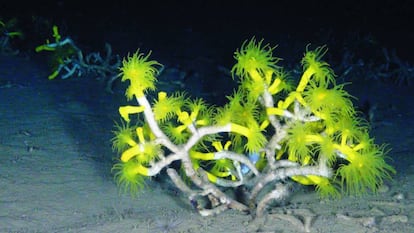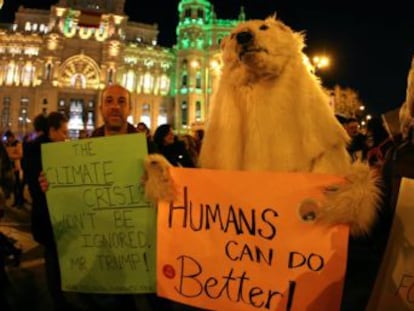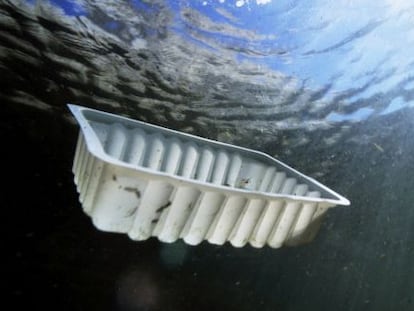The race to save the Mediterranean¡¯s deep-sea corals
Experts want greater protection for endangered species that are home to other forms of marine life


There are over 200 species of coral in the Mediterranean Sea (out of 5,600 species that have been described worldwide), and they need greater protection in order to survive in an environment affected by overfishing and climate change.
Researchers have been trying to save deep-sea corals, which live at depths of over 150 meters, but their efforts have come up against a lack of political will.
Every step we take represents an enormous effort. We¡¯re in a race against the clock to locate them
Pilar Mar¨ªn, Oceana
¡°Every step we take represents an enormous effort. We¡¯re in a race against the clock to locate them, because we still know very little about them, and meanwhile the trawlers that use large nets to sweep the seafloor keep advancing,¡± sais Pilar Mar¨ªn, a marine scientist at the ocean conservation organization Oceana. ¡°We need to get there before the colonies disappear.¡±
Once these colonies are found, countries should establish protection zones forbidding destructive fishing methods or any other activity that could endanger the corals, says this group.
As part of this ongoing fight, in 2017 the 22 members of the Barcelona Convention for the Protection of the Marine Environment and the Coastal Region of the Mediterranean (which answers to the United Nations), expanded the list of endangered species to include the four remaining deep-sea corals that were still not on it: Isidella elongata. Dendrophyllia cornigera, Dendrophyllia ramea and Desmophyllum dianthus.

That same year, in Spain¡¯s Balearic Islands, researchers found a colony of the critically endangered bamboo coral at a depth of over 400 meters somewhere between Ibiza and Formentera. This habitat, and another one in the Aeolian Islands in Italy, are the best-preserved examples known to exist in the Mediterranean. Experts estimate that the population has diminished by 80% in the last century.
¡°The fact that they are on the list means that they are endangered and that something needs to be done, but the Barcelona Convention has no powers over fishing, which is the greatest danger the corals face,¡± notes Mar¨ªn. ¡°Countries should have adopted protection measures, but to this day absolutely nothing has been done.¡±
In November, Oceana scored a victory: the General Fisheries Commission for the Mediterranean, a UN body made up of 23 countries including Spain, agreed to adopt a regulatory framework to preserve these delicate ecosystems.
There are a lot of people who make a living out of fishing, but they must keep in mind that if the habitat is exterminated, the resources will disappear
Covadonga Orejas, Spanish Oceanographic Institute
¡°We¡¯ve spent the last three years trying for these regulations to be established, because this is the commission with powers over fishing,¡± says Mar¨ªn. But the framework is still not binding, nor have any specific actions been drafted.
In the meantime, the practice of bottom trawling continues to ¡°ravage everything it finds in its way, and can destroy centuries-old colonies in a very short space of time,¡± says Covadonga Orejas, a scientist and coral specialist at the Spanish Oceanographic Institute in the Balearics (IEO).
Other fishing techniques that use fixed nets, longlines or traps can also cause damage if the gear snags on corals. When coral structures disappear, many other forms of marine life, including species that are fished commercially, lose their habitat.
Recovery is complicated by coral¡¯s slow growth rate of just a few millimeters a year. Growth is particularly slow in species that grow a calcareous skeleton or create large, branching masses.
Commercial exploitation can also hamper conservation efforts. The red Mediterranean coral, for instance, is used in jewelry, notes Orejas. For now, scientist have not managed to increase its protection status.
¡°There are a lot of people who make a living out of fishing, but they must keep in mind that if the habitat is exterminated, the resources will disappear,¡± she says. ¡°A forest without trees will have no animals, because these go where they can find shelter and build their homes.¡± In the case of the ocean, corals play the role of the trees. ¡°Through their structures they create a three-dimensional space where the other marine life can live.¡±
Besides human activity, corals have to put up with the effects of climate change, rising sea temperatures and a larger quantity of carbon dioxide in the ocean. These two factors increase the acidity of the oceans and reduce the calcification rate at which corals build their skeletons.
English version by Susana Urra.
Tu suscripci¨®n se est¨¢ usando en otro dispositivo
?Quieres a?adir otro usuario a tu suscripci¨®n?
Si contin¨²as leyendo en este dispositivo, no se podr¨¢ leer en el otro.
FlechaTu suscripci¨®n se est¨¢ usando en otro dispositivo y solo puedes acceder a EL PA?S desde un dispositivo a la vez.
Si quieres compartir tu cuenta, cambia tu suscripci¨®n a la modalidad Premium, as¨ª podr¨¢s a?adir otro usuario. Cada uno acceder¨¢ con su propia cuenta de email, lo que os permitir¨¢ personalizar vuestra experiencia en EL PA?S.
En el caso de no saber qui¨¦n est¨¢ usando tu cuenta, te recomendamos cambiar tu contrase?a aqu¨ª.
Si decides continuar compartiendo tu cuenta, este mensaje se mostrar¨¢ en tu dispositivo y en el de la otra persona que est¨¢ usando tu cuenta de forma indefinida, afectando a tu experiencia de lectura. Puedes consultar aqu¨ª los t¨¦rminos y condiciones de la suscripci¨®n digital.










































